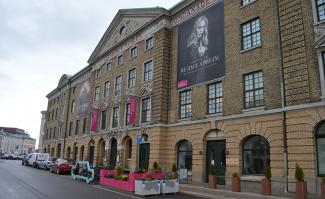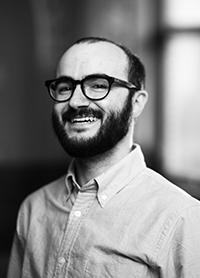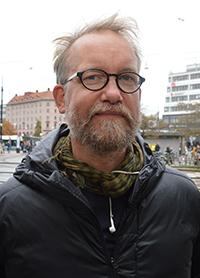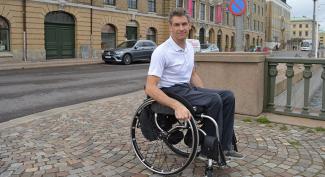Making the city accessible for all
The FUNKTEK project not only made the Museum of Gothenburg more accessible. The method where people with different types of function variations tested and improved the museum's exhibitions and activities have had a ripple effect in Gothenburg.

The UN-Human Rights Conventions article 27 state that "everyone has the right freely to participate in the cultural life of the community”
"It's a question of democracy. The culture in society must be accessible to everyone and everyone should have access to our public spaces, but that is not the case today, says Daniel Gillberg, Project Manager for Funktek and the Museum of Gothenburg.

Funktek wanted to change that. When the project was launched in 2014, the goal was to find new technical solutions that would make the Museum of Gothenburg more accessible. The idea was also that the solutions could be used in other urban development projects. During a number of workshops for three years, so-called Funktek Pilots was used, persons with different types of function variations, which was paid to test the museum, its exhibitions and city walks. The method gave clear results. The pilots highlighted issues that existed for them as individuals and helped to find solutions that worked better. According to Daniel Gillberg, it became apparent that the museum had overestimated how accessible it was. Although exhibitions were built according to the laws and norms many sites could for example quickly become unavailable if there were many visitors in the same room. One result was that most narrow spaces in exhibits the project worked with was removed. It also led to concrete changes in how installations and information became easier to address. Now, information texts have larger fonts and more contrasts and colours are used. Another example was that city walks were planned to avoid obstacles such as cobblestones and noisy environments.
The method became the solution
Daniel Gillberg emphasizes that the project gradually shifted focus from specific technical solutions. Working with the Funktek Pilots and the strength of that method was the most important insight. The challenge was now to spread that knowledge further.
"The Museum of Gothenburg has undergone major changes, and nothing would had changed without the tests with the pilots"
"The method became the solution itself and we would not have thought so in the beginning. The Museum of Gothenburg has undergone major changes, and nothing would had changed without the tests with the pilots. Working with people gives a deeper understanding than reading guidelines for accessibility on a paper."

Mistra Urban Futures role in the project was to contribute with the Centre´s experience and act as a bridge between research and practice.
"We wanted to take advantage of the practical experiences that existed from the Museum of Gothenburg and spread it to other people and organizations that work with urban development," says Per Myrén, Head of Education at Changemaker, and was a consultant for Mistra Urban Futures in Funktek. Knowledge from Funktek has been shared through information meetings, lectures at conferences and through two research reports. In addition, a training manual with the name "Funktek in one day" was produced, which describes the method and provides a basis for conducting workshops. Representatives from other projects were invited to attend the Museum of Gothenburgs’ workshops and participants in Funktek used the method when working with other areas in the city, such as the Jubilee Park in Frihamnen, Gothenburg. "When working with dialogues with citizens, it is important to familiarize yourself with the situation of the people you speak with." Now it was about accessibility for people with function variations, but user perspectives are central to all development work," says Per Myrén.
Effect on urban development
Several people involved in Funktek highlight the value of the broad cooperation between public authorities, research and civil organizations. A feature that also appears in other projects where Mistra Urban Futures played a role is co-creation, which means that different actors together acquire knowledge and continue to develop and spread it so that knowledge can benefit society at large. In this project, the paid Funktek pilots were experts on how the Museum of Gothenburg could become more accessible according to their preconditions. Mistra Urban Futures continues to spread knowledge about the successful method. Daniel Gillberg hopes that Funktek can get more people to evaluate accessibility in everything from exhibitions to new houses, renovations and public places.
“It's only when something is ready you can start testing it for real, but you can try to build prototypes. We want to inspire more to test the accessibility before everything is set in stone, because it will be expensive if the accessibility does not work at that stage”, he says.

"The actual experience in practice is key for getting a good result"
Henrik Ehrlington was part of the management team for Funktek and works at the Property Management Administration, which has the mission of leading the City of Gothenburg accessibility work. He believes that the experience from Funktek has been important and should be used widely when the city is developing. "The actual experience in practice is key for getting a good result," says Henrik Ehrlington, emphasizing that solutions that increase accessibility benefit everyone regardless if they have a function variation or not. "Society is developing and it is important that the city works for everyone. Regardless of function variation, increased accessibility is usually good for everyone and comfortable for the vast majority”.
Project facts
Project title: FUNKTEK
Project period: 2014 - 2017
Partners: Museum of Gothenburg, Utopia, Interactive Institute, Swedish Exhibition Agency, Changemaker and Mistra Urban Futures.
Financier: The Swedish Inheritance Fund (Allmänna arvsfonden)